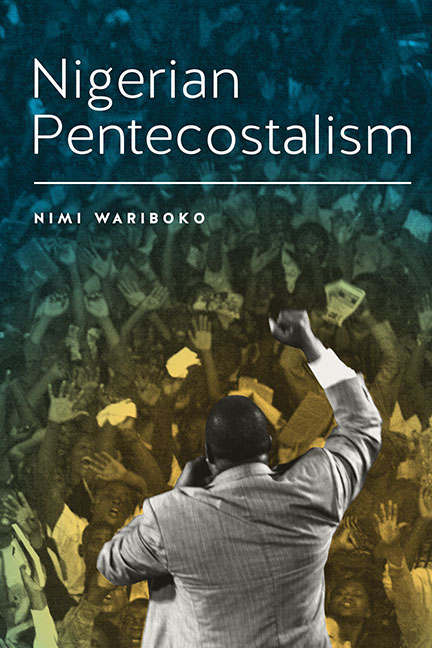Book contents
- Frontmatter
- Dedication
- Contents
- Foreword
- Preface
- Acknowledgments
- Introduction
- Part 1 Origins and Spirituality of Nigerian Pentecostalism
- Part 2 Ethical Vision of Nigerian Pentecostal Spirituality
- 6 Politics: Between Ontology and Spiritual Warfare
- 7 Miracles, Sovereignty, and Community
- 8 Altersovereignty and Virtue of Pentecostal Friendship
- 9 Spirituality and the Weight of Blackness
- 10 “This Neighbor Cannot Be Loved!”: Invisibility and Nudity of the “Pentecostal Other”
- 11 Pentecostalism and Nigerian Society
- Notes
- Bibliography
- Index
9 - Spirituality and the Weight of Blackness
from Part 2 - Ethical Vision of Nigerian Pentecostal Spirituality
Published online by Cambridge University Press: 15 March 2018
- Frontmatter
- Dedication
- Contents
- Foreword
- Preface
- Acknowledgments
- Introduction
- Part 1 Origins and Spirituality of Nigerian Pentecostalism
- Part 2 Ethical Vision of Nigerian Pentecostal Spirituality
- 6 Politics: Between Ontology and Spiritual Warfare
- 7 Miracles, Sovereignty, and Community
- 8 Altersovereignty and Virtue of Pentecostal Friendship
- 9 Spirituality and the Weight of Blackness
- 10 “This Neighbor Cannot Be Loved!”: Invisibility and Nudity of the “Pentecostal Other”
- 11 Pentecostalism and Nigerian Society
- Notes
- Bibliography
- Index
Summary
Ah, love, let us be true
To one another! for the world, which seems
To lie before us like a land of dreams,
So various, so beautiful, so new,
Hath really neither joy, nor love, nor light,
Nor certitude, nor peace, nor help for pain;
And we are here as on a darkling plain
Swept with confused alarms of struggle and flight,
Where ignorant armies clash by night.
—Matthew Arnold, “Dover Beach”Introduction
I will begin unceremoniously, presenting portions of two sermons. The first is delivered by Pastor Enoch Adeboye on September 30, 2011, in Floyd, Texas, near Dallas. In the narrative he gave a prominent place to his sensitivity to race issues:
There was a time after I became a Christian, particularly after I have been to Kenneth Hagin's camp meeting [Tulsa, Oklahoma, United States in the late 1970s], I saw him laying hands on people and people were falling under the power of the Holy Spirit. I said, “God, I want this one too.” I, in fact, challenged God on my way back home: “If you don't do what I saw you do in America, when I get back to Nigeria I am going to say you are racist.” …
So when I got home I told my father in the Lord—first Sunday after that one— “please give me an opportunity, I want to lay hands on the sick.” (You know we weren't doing that in the Redeemed before. Everybody was encouraged to pray on his own.) “Let me lay hands now—it is in the Bible.” He said: “Okay.” (You know I am his favorite boy, so he gave me some concessions.) So that Sunday people lined up and I began to lay hands upon them. Believe it or not, they began to fall. Oh, glory be to God. “And God you are not a racist.”
In a slightly different version of this narrative, there were a few more details. He said as he saw all the anointing on Hagin and the miracles that were wrought by the Holy Spirit through him, he cried: “God is not fair to black people. Why is there so much anointing given to a white man here in the United States and nothing like this is happening in Nigeria?”
- Type
- Chapter
- Information
- Nigerian Pentecostalism , pp. 221 - 257Publisher: Boydell & BrewerPrint publication year: 2014

